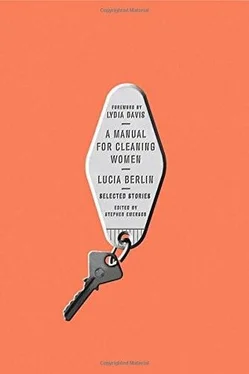It has nothing to do with whether the author is pessimistic or not, whether the events or feelings evoked are cheerful. The palpability of what we’re shown is affirmative:
People in cars around us were eating sloppy things. Watermelons, pomegranates, bruised bananas. Bottles of beer spurted on ceilings, suds cascaded on the sides of cars … I’m hungry, I whined. Mrs. Snowden had foreseen that. Her gloved hand passed me fig newtons wrapped in talcumy Kleenex. The cookie expanded in my mouth like Japanese flowers.
About this “joy”: no, it is not omnipresent. Yes, there are stories of unalloyed bleakness. What I have in mind is the overriding effect.
Consider “Strays.” Its ending is as poignant as a Janis Joplin ballad. The addict-girl, ratted out by a ne’er-do-well lover who’s a cook and trustee, has stuck to the program, gone to group, and been good. And then she flees. In a truck, alongside an old gaffer from a TV production crew, she heads toward the city:
We got to the rise, with the wide valley and the Rio Grande below us, the Sandia Mountains lovely above.
“Mister, what I need is money for a ticket home to Baton Rouge. Can you spare it, about sixty dollars?”
“Easy. You need a ticket. I need a drink. It will all work out.”
Also like a Janis Joplin ballad, that ending has lilt .
* * *
Of course, at the same time, a riotous humor animates Lucia’s work. To the topic of joy, it is germane.
Example: the humor of “502,” which is an account of drunk driving that occurs — with no one behind the wheel. (The driver is asleep upstairs, drunk, as the parked car rolls down the hill.) Fellow drunk Mo says, “Thank the Lord you wasn’t in it, sister … First thing I did, I opened the door and said, ‘Where she be?’”
In another story, the mother: “‘She hated children. I met her once at an airport when all four of my kids were little. She yelled “Call them off!” as if they were a pack of Dobermans.’”
Unsurprisingly, readers of Lucia’s work have sometimes used the term “black humor.” I don’t see it that way. Her humor was too funny, and it had no axe to grind. Céline and Nathanael West, Kafka — theirs is a different territory. Besides, Lucia’s humor is bouncy.
But if her writing has a secret ingredient, it is suddenness. In the prose itself, shift and surprise produce a liveliness that is a mark of her art.
Her prose syncopates and hops, changes cadences, changes the subject. That’s where a lot of its crackle is.
Speed in prose is not something you hear much about. Certainly not enough.
Lucia’s “Panteón de Dolores” is a wide-ranging story with great emotional depth. But it also has her alacrity. Read the passage that begins “Not listening though” and continues through “because of the pollution level.”*
Or this: “Mama, you saw ugliness and evil everywhere, in everyone, in each place. Were you crazy or a seer?”
The last story Lucia wrote, “B.F. and Me,” is a small one. It has no wallop or big themes, no infanticides, no smuggling, no mother-daughter or reconciliation. In a way, that’s why its art is so remarkable. It’s gentle; but it’s fast.
She introduces the creaky old handyman who comes to work on her trailer, as follows:
[B.F. was] gasping and coughing after he climbed the three steps. He was an enormous man, tall, very fat and very old. Even when he was still outside catching his breath, I could smell him. Tobacco and dirty wool, rank alcoholic sweat. He had bloodshot baby-blue eyes that smiled. I liked him right away.
That “I liked him right away.” It’s nearly a non sequitur. And in the near non sequitur lies the speed. And the wit. (Just look what it tells us about “I.”)
With a writer of this caliber, you can often recognize the work in one sentence. Here is a sentence from that same, final story, still on B.F. and his aroma:
Bad smells can be nice.
It is pure Lucia Berlin. It’s so corny (“nice”), so close to being just dumb. But it’s true, and it’s deep. Beyond that, set off against her generally urbane voice, the sentence is almost disingenuous. Which is part of why it’s fast. The shift in tone, and even voice, sends us, just like that, into new terrain.
Too, the sentence is dry. (How could a bad smell really be “nice.”) Dryness, it so happens — where things are more, and other, than they seem — is fast.
It’s five words, all monosyllables.
Of B.F.’s stench — no, she can’t call it a stench. Reek? No. She has to reach over to British slang to find a term that’s strong enough but still has neutrality, still makes no judgment.
“Pong.” His pong. Which brings us to — Proust.
“The pong of him was madeleine-like for me.”
Who but Lucia Berlin would write that? The pong was madeleine-like.
* * *
Compiling the stories for this book has been a joy in countless ways. One was discovering that in the years since her last book and her death, the work had grown in stature.
Black Sparrow and her earlier publishers gave her a good run, and certainly she’s had one or two thousand dedicated readers. But that is far too few. The work will reward the most acute of readers, but there is nothing rarefied about it. On the contrary, it is inviting.
Still, the constraints of a small-press audience may, at the time, have been inevitable. After all, Lucia’s whole existence occurred, pretty much, outside .
West Coast bohemia, clerical and blue-collar work, laundromats, “meetings,” stores that sell “one-shoes,” and dwellings like that trailer were the backdrop of much of her adult life (throughout which, her genteel demeanor never flagged).
And it was, in fact, “outside” that gave her work its special strength.
From Boulder, she wrote to me (and here she alludes to her constant later companion, the oxygen tank):
Bay Area, New York and Mexico City [were the] only places I didn’t feel I was an other. I just got back from shopping and everybody kept on saying have a great day now and smiling at my oxygen tank as if it were a poodle or a child.
Myself, I can’t imagine anyone who wouldn’t want to read her.
A tall old Indian in faded Levi’s and a fine Zuni belt. His hair white and long, knotted with raspberry yarn at his neck. The strange thing was that for a year or so we were always at Angel’s at the same time. But not at the same times. I mean some days I’d go at seven on a Monday or maybe at six thirty on a Friday evening and he would already be there.
Mrs. Armitage had been different, although she was old too. That was in New York at the San Juan Laundry on Fifteenth Street. Puerto Ricans. Suds overflowing onto the floor. I was a young mother then and washed diapers on Thursday mornings. She lived above me, in 4-C. One morning at the laundry she gave me a key and I took it. She said that if I didn’t see her on Thursdays it meant she was dead and would I please go find her body. That was a terrible thing to ask of someone; also then I had to do my laundry on Thursdays.
She died on a Monday and I never went back to the San Juan. The super found her. I don’t know how.
For months, at Angel’s, the Indian and I did not speak to each other, but we sat next to each other in connected yellow plastic chairs, like at airports. They skidded in the ripped linoleum and the sound hurt your teeth.
He used to sit there sipping Jim Beam, looking at my hands. Not directly, but into the mirror across from us, above the Speed Queen washers. At first it didn’t bother me. An old Indian staring at my hands through the dirty mirror, between yellowing IRONING $1.50 A DUZ and orange Day-Glo serenity prayers. GOD GRANT ME THE SERENITY TO ACCEPT THE THINGS I CANNOT CHANGE. But then I began to wonder if he had something about hands. It made me nervous, him watching me smoke and blow my nose, leaf through magazines years old. Lady Bird Johnson going down the rapids.
Читать дальше












